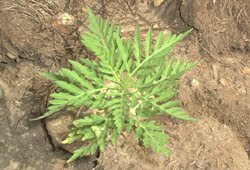The three weeds most often identified were common ragweed, giant ragweed and waterhemp.
Common Ragweed
The lowest area had 10-30% of the fields with resistance, in the mid-Red River Valley
The highest area had 30-60% of the fields with resistance, in central MN
Giant Ragweed
30-95% of the fields showed resistance, in south-central MN
Waterhemp (a member of the pigweed family)
5-20% of the fields showed resistance near the corner of ND, SD and MN.
Scary numbers caused by
1. high concentration of RR crops
2. over reliance of glyphosate alone for weed control
In Ontario we have been through similar situations before.
Triazine resistant lambsquarter and pigweed exploded in the 70's because we grew too much continuous corn and relied on atrazine for weed control.
Group 2 resistant foxtail, ragweed, lambsquarter, pigweed, waterhemp and others showed up in the last decade where we relied too much on group 2 products such as Pursuit and Accent.
Interestingly, atrazine and Pursuit are still effective herbicides when combined with other products, so all is not lost. I think the Ontario farmer is smart enough to realize the way to keep glyphosate as an effective herbicide is to rotate crops and tank mix other herbicides with glyphosate to keep resistance from developing.
On the other hand we do have confirmed glyphosate resistant giant ragweed in Essex County.
And a few growers are still lulled into thinking that glyphosate alone will solve all their troubles like the one below that Brian was asked to spray recently.
And I still hear too many of my chemical retailer friends talking about customers coming in after the crop is emerged with no herbicide applied, looking for the one cheap fix to take care of all their weeds. We can do better.




No comments:
Post a Comment